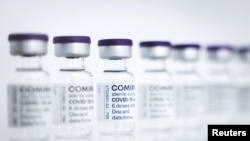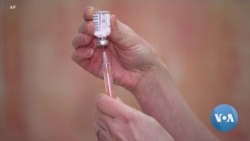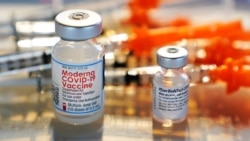A group of activist organizations says that at least nine executives and investors in companies making coronavirus vaccines have become billionaires in the last year thanks to the patents on their vaccines.
The People’s Vaccine Alliance, a grouping of several non-profit, non-governmental organizations including Global Justice Now, Oxfam and UNAIDS, is calling for the pharmaceutical firms to share their technology so that global production of vaccines can be quickly increased, as infections continue to surge in many poorer nations.
“The pharmaceutical corporations behind some of the most famous COVID-19 vaccines, like the company Pfizer ... and Moderna, they’re making huge profits from the monopoly they have on these vaccines,” Max Lawson, the head of inequality at Oxfam International, told VOA. “As a result, their investors and their CEOs are becoming billionaires for the first time ever.”
According to its analysis of the annual Forbes rich list published in April, the People’s Vaccine Alliance claims the new vaccine billionaires include the chief executive officers of U.S. pharmaceutical firm Moderna, and the German firm BioNTech, which helped develop the technology behind the Pfizer vaccine. They say four other executives or investors involved with Moderna, and three executives from the Chinese firm CanSino Biologics, have also become billionaires.
Lawson of Oxfam told VOA that the financial risk of developing the vaccines was effectively carried by the taxpayer. “These COVID-19 vaccines were funded by public money, by taxpayers like you and I. So, these are not the property of these companies and they should not be used to deliver these enormous profits.”
He added that the patents on the vaccines mean the pharmaceutical firms are able to dictate drug price and distribution.
“Because of these monopolies, we’re ending up with an artificial scarcity,” said Lawson. “And there’s quite enough space for these companies to make a decent return — not obscene profits, not creating billionaires — but also at the same time share their technology, share their intellectual property and allow every competent vaccine manufacturer on Earth to be producing the vaccines we need.”
In a statement, BioNTech said that it had already increased its production capacity up to 3 billion doses in 2021 and is working with 15 partners including Merck, Novartis Sanofi and Baxter under licensing and manufacturing agreements to further establish a global vaccine manufacturing network. The firm added that patents are not the limiting factor for the production of the vaccine, which is “a complex process developed over more than a decade.”
“All steps must be precisely defined and executed accurately. It takes experienced personnel. It takes raw materials that need to be sourced and qualified for use. It takes established processes for preparing the vaccine which need to be followed meticulously,” the BioNTech statement read. “If any of these requirements are not met, the quality, safety and efficacy of the vaccine cannot be ensured by the manufacturer nor the innovator.”
The company also noted that its CEO, Ugur Sahin, who was named in the People’s Vaccine Alliance report as a new billionaire, has not in fact sold any shares in the company.
Moderna did not respond to requests for comment by the time of publication. In October, the American company said it would not enforce the patents on any of its coronavirus vaccine technology.
Poorer countries are facing a dramatic shortfall in the supply of vaccines. The United States this month declared its support for the suspension of patents on coronavirus vaccines at the World Trade Organization, a move first suggested by India and South Africa.
The issue topped the agenda at a Global Health Summit held by the G20 group of industrialized nations in Rome Friday. In a joint declaration the G20 called for voluntary licensing and technology transfers but stopped short of supporting a suspension of vaccine patents.
The European Union pledged to give 100 million vaccine doses to poorer nations this year and build vaccine production hubs in Africa.







